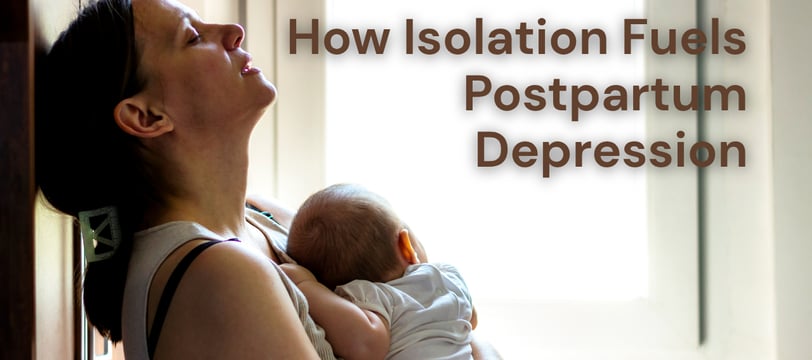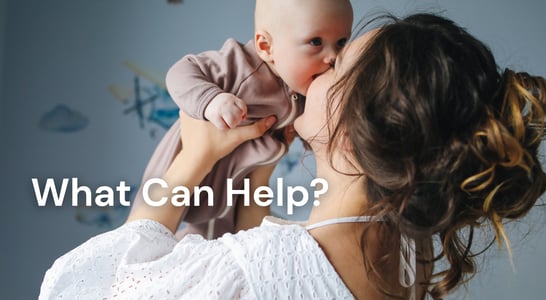How Isolation Fuels Postpartum Depression
7/2/20254 min read


Motherhood is often imagined as a communal experience - grandmothers passing down wisdom, friends dropping by with meals, neighbours cooing at the baby. But for many modern parents, the reality looks very different: long hours alone, endless routines, and a creeping sense of invisibility.
For mothers experiencing postpartum depression (PPD), this isolation is more than just inconvenient, it’s a dangerous accelerant. Without emotional connection, physical presence, or meaningful support, depression deepens, identity dissolves, and recovery feels further out of reach.
At Peace Temple, we work with mothers every day who say, “I never knew it would feel this lonely,” or “I’m surrounded by people online but still feel completely alone.” Their stories reflect a truth we need to talk about more: isolation isn’t just a side effect of PPD—it can be one of its root causes.
Understanding the Link Between Isolation and PPD
Postpartum depression is influenced by many factors - biological, hormonal, emotional. But isolation adds a uniquely painful dimension. When a mother feels physically alone or emotionally disconnected, it:
Increases stress levels and cortisol production
Deprives her of co-regulation (the ability to calm through social presence)
Heightens feelings of shame, failure, and inadequacy
Disrupts recovery by removing potential lifelines
In short, humans are wired for connection, especially during vulnerable transitions like childbirth. When that connection is absent, the nervous system doesn’t just feel stressed it can start to break down emotionally.
How Isolation Manifests During the Postpartum Period
Even in homes filled with people, new parents can feel deeply isolated. This experience isn’t just physical—it’s emotional, social, and spiritual.
1. Physical Isolation
This includes:
Being homebound due to recovery, breastfeeding, or sleep schedules
Limited transportation or mobility
A partner who works long hours or travels
These constraints can make each day feel like an endless loop, with no change in scenery or social interaction.
2. Emotional Isolation
Even with a partner, a mother may feel emotionally alone if:
She doesn’t feel heard or understood
Her partner minimizes her experience (“It’s just baby blues”)
She’s afraid to express her feelings honestly
This type of loneliness is particularly dangerous because it erodes emotional safety, making it harder to reach out for help.
3. Social Isolation
Friends may stop calling. Family may live far away. Or people may assume that because there’s a baby in your arms, your life is full.
Social media adds insult to injury—everyone else seems radiant, put together, fine. And so the mother scrolls in silence, comparing her pain to everyone else’s highlight reel.
At Peace Temple, we remind mothers: Isolation doesn’t always look like being alone—it’s how alone you feel in a room full of people who don’t understand.
Why Isolation Is Especially Harmful During PPD
1. It Reinforces Shame
When a mother is isolated, she has no external feedback to normalize her experience. She may assume:
“I’m the only one who feels this way.”
“I must not love my baby enough.”
“If I tell someone, they’ll think I’m unfit.”
Shame thrives in silence. Community, by contrast, is often the antidote.
2. It Disrupts the Healing Process
Support from others helps regulate the nervous system, reduce cortisol, and trigger oxytocin, the bonding and healing hormone. Without this, the body stays in a prolonged stress state, making it harder to sleep, focus, or recover emotionally.
3. It Increases Risk for Severe Depression
Numerous studies confirm that lack of social support is a major predictor of postpartum depression. Left unaddressed, isolation can also contribute to anxiety disorders, intrusive thoughts, and even suicidal ideation.
This is why at Peace Temple, we treat isolation not just as a circumstance but as a clinical risk factor worth addressing head-on.


What Can Help: Rebuilding Connection, Gently
Healing from PPD involves restoring emotional oxygen—moments of presence, touch, words, and warmth that slowly remind the nervous system: you are not alone.
Here are small but powerful ways to reintroduce connection:
1. Name the Isolation Out Loud
The first step is naming the feeling:
“I feel like no one sees me anymore.”
“I miss adult conversation.”
“I’m not okay being alone this much.”
Saying it out loud (even just to yourself) reduces its hold. Saying it to someone safe invites support.
2. Start With Low-Effort Social Contact
Reaching out doesn’t need to be a coffee date or a long phone call. Try:
Texting a friend “I’m struggling today—can we talk later?”
Joining a low-key virtual support group
Scheduling one short video check-in per week
At Peace Temple, we offer virtual postpartum support circles that let mothers connect gently—without pressure, performance, or pretense.
3. Rebuild Micro-Moments of Connection
Even if your energy is low, try to:
Make eye contact with your baby, even briefly
Step outside and wave at a neighbor
Thank a cashier or delivery person with eye contact and a smile
These may feel small—but they create tiny emotional bridges back to the world.
4. Ask for What You Need—Even If It Feels Awkward
Loved ones may not realize what kind of support you need. Be specific:
“Could you come sit with me while I feed the baby?”
“Can we go for a walk—I don’t want to be inside alone today?”
“I’m not looking for advice, just someone to talk to.”
These small asks can be the beginning of deeper support.
5. Work With a Therapist Who Understands PPD
Therapy provides structured, judgment-free connection, which is vital when social energy is depleted.
Peace Temple’s trained postpartum therapists understand how isolation and depression feed each other and they offer tools to gently untangle the cycle.
What to Remember If You Feel Alone
If you're reading this from a place of isolation, here’s what we want you to know:
You are not weak for struggling.
You are not the only one who feels this way.
You deserve connection, even if you can’t imagine what that looks like right now.
It may feel like no one sees you but you are deeply seen, and your experience matters.
Final Thoughts: Connection as a Lifeline
Isolation is more than a quiet room it’s a quiet ache. But even the smallest connection - a text, a smile, a shared silence can crack the shell of loneliness and let the light back in.
You don’t need a crowd. You need a few safe people. You don’t need to be chatty. You just need to be heard. And you don’t need to fix everything before reaching out - you can reach out now, as you are.
At Peace Temple, we believe connection is not just comforting, it’s medicinal. And you are worthy of it.
